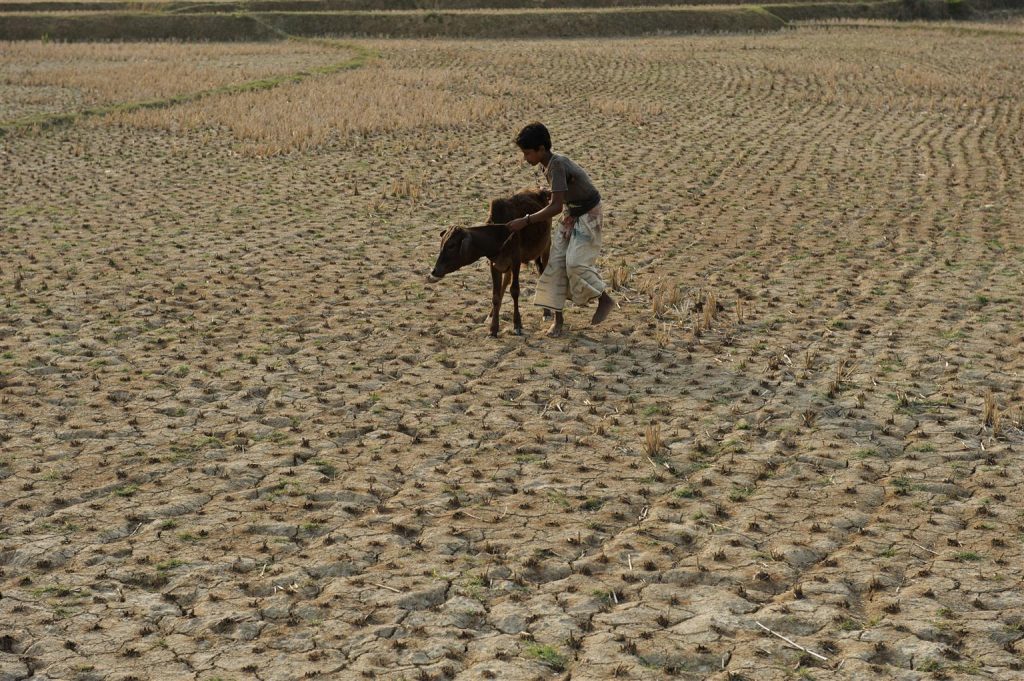Andrew Seal and Rob Bailey discuss the limitations of data-driven humanitarian efforts, and the lessons learned from the 2011 Somalia famine.
Briefings
Famine in Somalia and the Failure of Data-Driven Humanitarianism

UNICEF/UNI118546/Nooran
Mohammed Shahin Ali, 14, walks through a field dried and cracked from lack of rain in search of grass for his cattle, in the village of Hat Bokoil, in the upazila (sub-district) of Nachole, Chapai Nawabganj District. I look after 19 cows, Mohammed said. There is drought everywhere because of lack of rain. I have to walk long distances to find grass for my cattle. It is very difficult. I hope it rains soon.
In October 2009, low-lying Bangladesh remains prone to natural disasters and especially susceptible to the effects of climate change. Localized cyclones and floods affect Bangladesh yearly, while larger scale disasters periodically wreak wider spread havoc. Their impact is exacerbated by endemic problems including food insecurity, entrenched poverty, malnutrition, pollution and limited access to basic services. The inhabitants of remote, rural areas, further constrained by limited infrastructure, are particularly vulnerable to environmental threats. This is especially the case for the inhabitants of chars small, sandy islands created, and destroyed, by floods or erosion. Lacking alternate places to live, char inhabitants farm or raise livestock, occupations that are highly vulnerable to seasonal monsoon flooding. Char schools are also threatened by impermanence and attendance is often low; domestic obligations, essential to their families' well-being, take precedence over childrens education. Survival itself is precarious. UNICEF programmes in Bangladesh in health and nutrition, water, sanitation and hygiene, education and child protection must also increasingly address the mounting effects of climate change.
Related content
Briefing
Key Considerations: Child Engagement in the Context of Disease Outbreaks in Eastern and Southern Africa
Effective child engagement strategies are essential to optimise the response to disease outbreaks and minimise their impact while ensuring children’s protection, well-being and resilience. When children understand disease outbreaks, they are better able to cope, contribute and recover. This promotes…
Central and East Africa Hub
SSHAP
2024
Briefing
Key Considerations for Responding to Floods in South Sudan Through the Humanitarian-Peace-Development Nexus
In common with many other African countries, the Republic of South Sudan is increasingly experiencing devastating floods linked to climate change.1,2 The Indian Ocean Dipole (IOD) and El Niño regulate the climate of Equatorial Eastern Africa. In 2019, a dipole…
Central and East Africa Hub
SSHAP
2024
Report
Conflict-Sensitive Returns and Integration in South Sudan
Since fighting flared up in Sudan in April 2023, an estimated 8.2 million Sudanese have been forcibly displaced, out of which 1.7 million are hosted by neighbouring countries, including 588,711 people by South Sudan.1 At the same time, an estimated…
Central and East Africa Hub
2024
Briefing
Key Considerations: Social, Structural and Community Dynamics of Cholera Transmission and Mortality in Ethiopia
The current cholera outbreak in the Federal Democratic Republic of Ethiopia began in August 2022. As of April 2024, active outbreaks had been recorded in most regions of the country, including: Amhara; Dire Dawa; Harari; Oromia; Southern Nations, Nationalities and…
Central and East Africa Hub
SSHAP
2024


